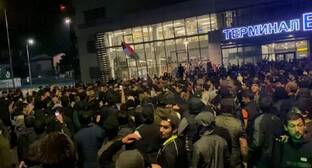05 December 2016, 09:00
Week in the Caucasus: review of main events of November 28-December 4
Liquidation of Rustam Asilderov, suspected of organizing terror acts, in Dagestan; bad weather in Kuban, Georgia, and Abkhazia, which results in emergencies; decision to raise tariffs for gas and electricity in Azerbaijan; bankruptcy of "Nairit" Factory in Yerevan; major road traffic accident in Chechnya, followed by police raids on roads and stop of sale of alcoholic drinks; adoption in the first reading of the Social Code in the Astrakhan Region; mass poisoning of employees of "Magnit" stores in Krasnodar, – see the review of these and other events in the Caucasus during the week of November 28-December 4, 2016, prepared by the "Caucasian Knot".
Law enforces report on liquidation of Rustam Asilderov, a militant leader, in Makhachkala
On December 3, the counterterrorist operation (CTO) legal regime was introduced in the village of Talghi on the outskirts of Makhachkala. According to law enforcers, during a special operation, a private house with a yard was cordoned off, which sheltered people suspected of involvement in the armed underground. During the negotiations, when proposed to surrender, they opened fire and were killed by return fire. In total, five militants were killed. One of them was identified as Rustam Asilderov, a leader of the terrorist organization "Vilayat of Caucasus", who in December 2014 was one of the first who swore allegiance to Abu Bakr al-Baghdadi, a leader of the terrorist organization "Islamic State" (IS), banned in Russia by court. Rustam Asilderov was suspected of organizing a number of attacks and terror acts. According to the FSB, out of the terror acts committed by militants led by Rustam Asilderov, the terror acts committed in 2013 inVolgograd in public transport and at the railway station were the largest terror acts by number of victims. On December 4, the CTO legal regime in the village of Talghi was lifted.
Several regions of Caucasus hit by natural disaster
During the past week, the regions of the Caucasus once again came under unfavourable weather conditions. On November 30, heavy snowfall hit the KrasnodarTerritory. It deprived of electricity supply 21,800 residents of several districts of the KrasnodarTerritory, and trains departed behind the schedule. On November 30, the ice covered the section of Gudauri-Kobi of the Georgian Military Road and traffic of heavy vehicles and multi-seat buses was stopped. On December 1, inGeorgia, traffic was restricted after a heavy snowfall, and in some places, traffic on the roads leading to the borders with Turkey and Armenia was completely banned. On December 2, the Georgian Military Road and the Transkam were completely closed for all vehicles.
On December 3, the Kerch ferry service, connecting the KrasnodarTerritory and the Crimea, was stopped twice a day because of the strong wind gusts, which speed reached 20 meters per second in the area of the Kerry ferry. On the same day, in Sochi, the wind gust speed reached 30 meters per second, and the city was hit by a storm of 5-6 points and a heavy rain. At the local airport, 20 flights were delayed. The bad weather brought destructions to the coastal and mountain clusters of the resort. In particular, in the Khosta and Central Districts of Sochi, the wind removed roofs of two residential apartment buildings. In Sochi, the wind fell down trees, local power supply interruptions occurred, and a gas pipeline was damaged. In the Lazarevskoe District, landslides caused delays of trains. Besides, on December 3, a woman fell victim to a storm wind in Sukhumi, and at night of December 3, a hurricane damaged the coast of Adjaria.
Azerbaijani authorities decide to raise tariffs for gas and electricity
On November 28, the Tariff (Price) Council of the Azerbaijani government made a decision to impose a "differentiated system" of payment for some public services. New gas tariffs will take effect starting from January 1, 2017, and new tariffs for electricity from December 1, 2016. Oppositionists have called the new tariffs in Azerbaijan as anti-popular. According to the opposition, the increase in tariffs will have a negative impact on the population. The materials criticizing the decision made by the Tariff (Price) Council have been published by the websites of the "Radio Liberty" and "Voice of America" and by the website of the opposition newspaper "Azadliq". After that, people experienced problems with access to those websites. The news website "Politika.az" has published a number of articles reporting that the people protest against the new tariffs. Then, the website editor was summoned to the General Prosecutor's Office and warned about the possibility of sanctions in the case of publication of new critical materials concerning the tariffs. According to the supervisory authority, the information contradicts the actual situation, and the prediction of the increase in prices for consumer goods and food voiced by authors of the published materials incites citizens to mass protests.
In Yerevan, "Nairit" Factory recognized bankrupt
On November 28, the Yerevan court granted the claim filed by the Company "Electric Networks of Armenia" to recognize the bankruptcy of the "Nairit" Factory, which used to produce chloroprene rubber in demand at world markets, but stayed idle since April 2010. The decision to recognize the chemical plant a bankrupt came as a surprise to its former workers, who held regular protest actions with the demand to pay wage arrears, resume the activities of the plant, and pay off fines for late payment of wages. The workers accused the Armenian authorities of disrupting the tender for the restart of the plant. On December 1, they held a protest action in front of the building of the Armenian government and stated that the government encouraged the bankruptcy of the plant.
In Chechnya, fatal road traffic accident with seven casualties provokes round-the-clock police raids; entrepreneurs stop selling alcoholic beverages
At night of November 28, on the "Kavkaz" Highway in Chechnya, a major road traffic accident occurred, in which seven people were killed at the place and two others were hospitalized. All the men of the family of deceased Alam Khadjaev, whom investigators believe to be the culprit of the road traffic accident, had left their village. This was reported by local residents, who pointed out to the fact that the road traffic accident might provoke a blood feud. Ramzan Kadyrov reported on the road traffic accident. He referred to witnesses and said that the culprit of the accident was in a state of alcoholic intoxication. Law enforcers took his blood samples for determining the existence of signs of alcoholic intoxication.
Starting from November 29, the Chechen police launched round-the-clock raids on the roads of the republic. During two days, the police detained 22 drivers in a state of alcoholic intoxication. 169 cars were brought to police parking places for violation of traffic rules. Besides, after Ramzan Kadyrov had stated that the suspected culprit of the fatal road traffic accident on the "Kavkaz" Highway was in a state of alcoholic intoxication, all the owners of the shops selling alcoholic beverages in Chechnya stopped their operation. According to Magomed Daudov, the chief of the operational headquarters on prevention of road traffic accidents, the shop owners voluntarily stopped selling alcoholic beverages.
In Astrakhan Region, Social Code adopted in first reading causes protests
On December 2, the Duma of the Astrakhan Region adopted in first reading the Law "On measures of social support and social assistance to certain categories of citizens in the Astrakhan Region", the so-called "Social Code". The law introduces in the region the "need-criterion" for regional benefit recipients, which is defined as cost of living multiplied to need-criterion. Both values are to be determined by the government of the region. The meeting of the Duma was held on December 2 against the protest action organized by people dissatisfied with imposition of restrictions for benefit recipients, and the protest action was continued in Astrakhan as a series of protests against the adoption of the Social Code.
In Krasnodar, mass poisoning of employees of "Magnit" stores occurs
On December 3, 66 people were brought to hospitals of Krasnodar. The patients were diagnosed with an acute intestinal infection. During the day, the number of victims increased to 99 people. By the morning of December 5, it was reported that 133 employees of Joint-Stock Company (JSC) "Tander" were brought to hospitals with symptoms of poisoning. All patients are employees of the JSC "Tander", which owns a network of the "Magnit" retail stores. Employees of JSC "Tander" felt ill after a dinner in a dining room, where they ate a salad "Zastolny". This type of salad was not at the retail stores. It has been already reported that Salmonella was detected in the salad. Investigators have launched preliminary investigation on the fact of mass poisoning.




